Over the course of my studies and career, I’ve been fortunate to attend many masterclasses and have lessons with some of the greatest horn players in the world. One of the questions that students would often ask these great performers is, “What does it take to make it?” One of the common answers I heard from them was that, among other things, you must be smart. Smart about how you approach the horn, smart in the way you practice, smart in your decisions regarding your life and career. Michael Atkinson, from the first time I met him, always struck me as being this kind of thinking horn player. His wheels are always turning and ideas are always flowing. He is a problem solver – methodical and detail-oriented, while able to think incredibly creatively and outside the box and without letting his thinking get in the way of his instinctive playing and his creativity. He is the first person who introduced me to the methods and exercises of Carmine Caruso (which are methodical, detail-oriented exercises that can imbue one’s playing with order and solve various problems – sound familiar?). And while in school together, I felt like every time I talked with him, he would say something that would suddenly make me see something in a different light. It typically would spark a sense of creativity and outside-the-box thinking in me, but would seem completely logical at the same time!
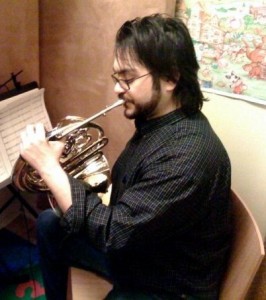 As time went on, I became more aware of just how wide-ranging Mike’s interests and projects are and just how many different things he has his fingers in! What we talk about in the following paragraphs still only covers a portion of his interests and experiences. I hope you enjoy as much as I did his fascinating anecdotes and thoughts throughout this interview: his start on the horn, his time in China, his observations about being a musician and a freelancer in these times, and learning about all of his many projects and endeavors. I think you just might find your own ideas and juices flowing a little more after reading what Michael has to say!
As time went on, I became more aware of just how wide-ranging Mike’s interests and projects are and just how many different things he has his fingers in! What we talk about in the following paragraphs still only covers a portion of his interests and experiences. I hope you enjoy as much as I did his fascinating anecdotes and thoughts throughout this interview: his start on the horn, his time in China, his observations about being a musician and a freelancer in these times, and learning about all of his many projects and endeavors. I think you just might find your own ideas and juices flowing a little more after reading what Michael has to say!
Basic Info and Beginnings
Hometown: Pittsburgh, PA
Schools attended: Juilliard (B.M. and M.M.); I also did one year of DMA studies at SUNY Stony Brook.
Horn teachers in middle/high school: Carl Iezzi, Dennis Abelson
Horn teachers at Juilliard: Jerome Ashby, William Purvis
Can you tell me how you got your start on horn?
How I found my way to the horn is a funny story: my parents bought me a 33 ⅓ RPM LP player, and one of the albums was “Big Bird Introduces the Orchestra!” Before I had a chance to listen to it, I used it as a projectile weapon in a skirmish with my younger brother Jonathan, which resulted in serious damage to the LP. The French horn feature track (I think it was a polka) was so scratched that it played only ten seconds before the needle jumped- I heard a few seconds of the horn and it immediately jumped to the next track, which was bassoon. The rest of the tracks were undamaged, so I heard every other instrument in the orchestra except the horn. When I was 8, I was allowed to join the school orchestra because I had good grades. When Mr. Davis asked which instrument I wanted, I chose the horn because I wanted to know what it sounded like!
What was your process of knowing you wanted to be a horn player? Was there anything else that you considered doing?
Even though I played in elementary school and middle school orchestras, I was initially more interested in being a comic book artist or an architect until I began taking private lessons and doing more ensemble playing outside of school. At age 12 my interest and commitment grew when I got my first horn. My parents worked hard and borrowed money from my grandparents to buy me a great first instrument (a brass Reyonolds Contempora). It was much better than the school instruments I used, and I felt very inspired to practice. I joined three youth ensembles and played in these groups every weekend of the school year. In high school, I took extra music courses and classes at Carnegie Mellon University, including university-level Lit/Rep classes lead by Pittsburgh Symphony Orchestra principal trumpet George Vosburgh. I also did two summers in the Chautauqua Youth Orchestra, which were some of the happiest times of my life.
There were many opportunities to be inspired in Pittsburgh, including the great fortune to have the Pittsburgh Symphony Orchestra as my hometown orchestra. I took full advantage of the tickets provided by the Pittsburgh Youth Symphony to its members. Hearing the standard rep every weekend performed at such a high level was supplemented by yearly “side-by-side” concerts with the PSO. I played in four of these events, and they all included masterclasses and a seat next to the pros. I was twice seated to the right of Bill Caballero which was, indeed, an amazing education!
The experiences of those concerts were life-changing; they gave me a visceral, larger-than-life idea of what I would have to strive for as a professional musician. I had much support, encouragement, and opportunity throughout my time as a young musician in Pittsburgh, for which I am very grateful.
China
You spent one year in China, and I am wondering if you could share with me some of your thoughts about (and experiences of) this vast and ever-growing country!
At that time, the situation with the Shanghai Broadcasting Symphony Orchestra (now called the Shanghai Philharmonic), combined with the culture shock of my first trip to Asia, made for an intense experience. I arrived knowing only xie-xie and ni hao, but eventually learned functional Mandarin, and even a little Shanghainese, which made getting around town and shopping a lot easier (as well as rehearsals which were sometimes conducted in Chinese). People were very friendly and always tried to speak English; many of the people I encountered in Shanghai spoke some English. The food was a little strange at first, especially when I learned that nobody knew what General Tso’s chicken was…. So, I ate a lot of McDonald’s (where one could get a breakfast sandwich all day!), and a lot of “American-style” food at Malone’s American Bar & Grille. At the beginning, eating familiar food was therapeutic. So was drinking lots of Tiger Lager! Eventually, I did eat some amazing real Chinese food, especially the Shanghainese cooking style, and Szechuan hot-pot that I thought would kill me.
The Chinese musicians were mostly very nice, but some were not very happy to have us there. I did not understand why until I learned that the foreign musicians’ salaries were six times more than what the Chinese musicians made. However, once the Chinese musicians they had a job with that orchestra, they had it for life, while the foreign musicians were never offered permanent positions, while subject to review at any time. There were some working condition/loss of wages/”contract” problems with the orchestra. During my season there, problems with not being paid according to contract arose, especially last-minute changes of schedule and cancellations. If we ever left the country for a vacation or otherwise, we had to get permission from the orchestra to do so. I later learned that the SBSO was funded primarily by the Cultural Ministry, which explained why many standard repertoire concerts were cancelled in favor of more nationalist-themed concerts (quite a few of them on TV, especially around Chinese holidays). One time, we played a full two-hour program of Chinese folk songs which had been orchestrated to include a large band of traditional Chinese instruments. We had a morning rehearsal and a short lunch break before a full dress rehearsal run-through for an audience. It turned out the Mayor of Shanghai was in attendance. After seeing the run-through, he ordered the entire company to rehearse another five hours! After he left the building, we rehearsed for about another hour and took a break. Rehearsal never started back up, we all sat around the venue, reading books, practicing or text messaging. When some other foreign musicians and I tried to leave, we were ordered to stay in the building until the end of the five-hour extra rehearsal time. Apparently, the mayor was having the building watched. It was frustrating and very creepy. The SBSO also participated in political concert events presented at the APEC investors summit, which were three-hour-long showcases full of Chinese culture, history, and arts. The format was an extended variety show including a booming MC introducing each act over the PA: troupes of acrobats, ethnic Uyghur dancers from Xinjang Province (who rode the train five days across the country to be there!), martial-arts demonstrations, a ballet duo, and lots of traditional and modern ethnic music. Showmanship was also part of the act for the orchestra: they sat us on a large moving platform and pushed us briskly from the rear of the stage forward, all while playing the final recap and coda from Dvorak’s “Carneval” Overture. (It’s not easy to play while a rickety platform jerks to a start and stop. One of my brass colleagues’ lips were bruised when the wheels on the platform got stuck while we were playing). Indeed, being a Western-style orchestra in the midst of a Chinese Cultural Extravaganza felt a little strange, but it was one hell of a show!
I am grateful for the time I spent there, in large part because it gave me appreciation for the many things I had taken for granted in the Western world.
Can you comment on the musical scene in China? Many people here see it as a future hub and hotspot for Western Classical music. What are your thoughts about this?
I think that Western Classical music in China will continue to flourish. There is no lack of enthusiasm, resources, or excellent new concert halls. While I was in the SBSO, students from the Shanghai conservatory were frequently employed as subs/extras. I met some extremely talented horn and wind players, already doing some amazing things – even more amazing considering how they figured things out without the same inherited system of traditions and culture that American and European students have at their disposal. I also had a great time playing in the first-ever Shanghai New Music Festival, and answering a lot of questions about stopped horn and what the horn could actually do. A lot of bright-eyed young composers had their first experience with a professional orchestra in the $150 million/1800-seat Shanghai Grand Theater in the middle of People’s Square. It was a memorable day!
The biggest challenge I see for music and the arts in China is the role that artists and creative people will be allowed to play in their rapidly modernizing yet socially repressed society. The current plight of the artist Ai Weiwei encapsulates this dilemma. He has captured the imaginations of many Chinese and many others across the world. As a result, his Shanghai studio was demolished by government forces and is currently in custody for “customs violations.” More recently, Wang Jun, another Chinese artist, has been detained and evicted for making reference to Ai Weiwei at a Hong Kong Arts Festival. Obviously, this and many other such behaviors prohibit artists from expressing themselves freely. Of course, we know from the lives of Shostakovich and others that even the most vile oppression is not enough to extinguish creativity and great art. Chinese musicians and artists have a bright future, and we should all pay attention to what they have to say.
Life in New York and Projects
Tell me your thoughts about living as a musician in New York – what do you find to be the benefits and the challenges of that environment?
I like being a working New York musician – my affinity and respect for the music scene here began in my teens; listening to recordings of New York groups, taping and re-watching Live From Lincoln Center broadcasts, and hearing anecdotes from teachers in Pittsburgh who had friends in the city. When I was 13, one of my teachers, Karen Sloneker, was able to get me a lesson with Bill Purvis while he was soloing with the area. I was really nervous, but he was very kind and graciously answered all of my silly questions. I always had the feeling that there were a lot of things happening in NYC, and I wanted to be there.
The benefits to being a musician in New York are numerous. Many creative and highly-driven people working here, and being a part of it all sharply focuses my energy. I enjoy having relationships with a hugely diverse community of outstanding musicians in many different situations. Culture of every stripe is happening here, probably more so than anywhere else in the US, and most of it at a high level. New Yorkers also have the incredible benefit of the world’s orchestras regularly passing through Carnegie Hall. Brooklyn is also quickly transforming into a very artistic place, and, at this stage of its renaissance, opportunities for musicians are rapidly proliferating. There is much here to feed one’s soul artistically, and a lot of motivation to work hard.
On the other hand, the same issues that have been affecting all musicians in the modern world have also had an impact here on the NYC scene. Within the freelance spheres I operate, just about everyone is working less this year than the previous two or three years. The overall amount of available work has been diminishing for a while, but there was a more dramatic decline in the years following the global economic crisis of 2008. Another blow was the recent closing of many shows that had large pits (South Pacific and West Side Story, to name a couple). More recently, there is the troubling news about City Opera and Philharmonic of the Americas. People are still working, but less than before, either in overall volume of work, or variety of available work, and very often for less money. (……and the rent is still too damn high!)
Despite all of this, many new projects are beginning to take shape, so there is plenty reason to be hopeful. Music and musicians have been reinventing themselves for hundreds of years, and we will continue to do so as the world continues to change.
You have your fingers in so many different projects and strike me as having an adventurous and entrepreneurial spirit. Arranging and orchestrating, working and playing with The Knights, and it looks like a little conducting as well! Are these interests that you have always had?
I like challenges and variety, and I endeavour to do whatever I do at as high a level as possible – this is mainly what drives my sense of adventure.
Initially, my interest in arranging/orchestrating/composing was an extracurricular hobby. It began when I was in middle school, arranging some jazz band charts for a trio, transcribing Empire Brass arrangements from their recordings for me and my fellow brass geeks to play. I even wrote some very short and corny trumpet and horn duets to play with my brass teacher. After buying my first score (the Dover edition of the Bach Brandenburg Concertos and Orchestral Suites), I became immediately fascinated with notation and writing out music. I studied scores and CDs checked out from the Carnegie Library, and kept buying from the BMG CD mail order club. Eventually began writing small pieces, using a Macintosh SE at my school. I wrote two pieces in high school, and had much encouragement in my endeavors by my composition teacher Dr. Victor Grauer. However, once I got that performance-driven environment at Juilliard , composing and arranging fell to the wayside.
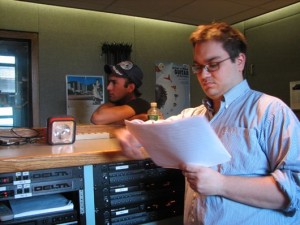 Ten years after I stopped composing, I acquired a copy of Sibelius notation software and quickly figured out the basics. After attending a few workshops and seminars, I had become pretty fluent; my newfound skills enabled me to do a lot more writing of all kinds, including the occasional little arranging and copying jobs. Opportunities to put my arranger chops to use started to pick up for me quite a bit after I met Sufjan Stevens, who hired me to play horn and do some arranging on a few tours. Working with Sufjan and his musical family inspired me deeply, and I began to write music again in 2006. Since then, I have completed a set of five horn duets, a mixed ensemble piece, and a woodwind quartet. I do have many other pieces sketched out and a few of them nearly complete, including a brass dectet for my friends in the Washington D.C.-based National Brass Collective.
Ten years after I stopped composing, I acquired a copy of Sibelius notation software and quickly figured out the basics. After attending a few workshops and seminars, I had become pretty fluent; my newfound skills enabled me to do a lot more writing of all kinds, including the occasional little arranging and copying jobs. Opportunities to put my arranger chops to use started to pick up for me quite a bit after I met Sufjan Stevens, who hired me to play horn and do some arranging on a few tours. Working with Sufjan and his musical family inspired me deeply, and I began to write music again in 2006. Since then, I have completed a set of five horn duets, a mixed ensemble piece, and a woodwind quartet. I do have many other pieces sketched out and a few of them nearly complete, including a brass dectet for my friends in the Washington D.C.-based National Brass Collective.
I find it challenging to write in the pressure-cooker of NYC. Between the noise of the urban environment and paying the bills, it is often hard for me to get to a quiet enough head-space to focus on writing. I am, however, planning a trip to somewhere quiet and sans-internet in the near future to do some writing.
I’m glad to have found my way back to writing music, especially because it was something I never thought I would do again. I have come to realize that being engaged with music away from the horn adds extra dimension and balance to my awareness as a performer. It helps to understand the process and point-of-view of a composer by writing some music. There is a fun and therapeutic quality to playing with sounds in a space that has far fewer rules than those of interpreting music.
Tell me about some of your arranging projects. What kinds of things do you find most satisfying to do?
I take joy in facilitating the exchange of musical ideas in any genre, idiom or ensemble. Last fall, I did an arrangement/re-imagining of Pink Floyd’s “Comfortably Numb” for The Knights, which we played in Bonn. I have also orchestrated a rock-and-roll medley that was used by Rock and Republic Jeans during NYC Fashion Week 2008. Recently, I have been doing some arrangements of Eastern European folk music for Lara St. John, who played these at a Juno Awards concert this year, and on a CBC Toronto radio show. Also in the works are some holiday songs for the Patriot Brass Ensemble. Currently, I am working on transcribing a piece for flute and signal processing by Mikael Karlsson for horn+electronics. Working closely with Mikael, I have learned more about signal processing and am planning on using it in my upcoming work. Recently, I joined the Spectrum Brass Quintet, and will also do some arranging and original compositions for us in the near future.
I’d love to learn more about The Knights – it looks like a fabulous group and a relatively new one. Can you talk about what it takes to be in on the ground level of building a new group and being a musical entrepreneur?
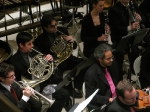 It’s hard to find the words; the best way I can describe it is every time we play feels like being at music camp for the first time. There are many talented musicians in The Knights, and the environment that Eric and Colin Jacobsen have created is very conducive to exploring and utilizing all of the group’s individual and collective talents. We play arrangements and pieces written by fellow Knights, we break into smaller ensembles for some concerts, and we like to rehearse and even do sectionals – a lot. The Knights also handle the administration of the group through player committees. As one of my favorite Knights, Christina Courtin, puts it: “We like music!”
It’s hard to find the words; the best way I can describe it is every time we play feels like being at music camp for the first time. There are many talented musicians in The Knights, and the environment that Eric and Colin Jacobsen have created is very conducive to exploring and utilizing all of the group’s individual and collective talents. We play arrangements and pieces written by fellow Knights, we break into smaller ensembles for some concerts, and we like to rehearse and even do sectionals – a lot. The Knights also handle the administration of the group through player committees. As one of my favorite Knights, Christina Courtin, puts it: “We like music!”
It is really exciting and rewarding; going from having pickup concerts in and around NYC to having management, five CDs, one Juno Award, and a DVD is thrilling. More importantly, we have all grown together musically and as friends and colleagues. I’m looking forward to the next couple of years – there are some exciting things in store! (I would also like to share this 3-minute video which gives a great picture of The Knights and what we have done so far.)
I understand you’ve been doing some work with the ever-more-famous Genghis Barbie. Tell me about working with them and your thoughts about this unique group!
 Yes, it is true! I got to know the Barbies at various points over the years, and am happy to have them playing my works. At first, I was unsure about what they wanted to do with such a group, but as time went on, I became impressed at their dedication to the hard work of promoting themselves and finding new opportunities. They really carved out a place for themselves, and people are talking about them quite a bit on the internet and around town. I smiled when they turned up on Metafilter yesterday! Because of Genghis Barbie, more people are seeing/hearing/talking about (of all things) a group of four French horn players. This is indisputable, and it is also a very good thing that new people are experiencing the horn. I respect their dedication and efforts, and look forward to our future projects together. Currently, I’m remixing the first arrangement I did for them (Take on Me by a-ha), which will include amplification and other effects, plus a beats track. It’s gonna be hot….
Yes, it is true! I got to know the Barbies at various points over the years, and am happy to have them playing my works. At first, I was unsure about what they wanted to do with such a group, but as time went on, I became impressed at their dedication to the hard work of promoting themselves and finding new opportunities. They really carved out a place for themselves, and people are talking about them quite a bit on the internet and around town. I smiled when they turned up on Metafilter yesterday! Because of Genghis Barbie, more people are seeing/hearing/talking about (of all things) a group of four French horn players. This is indisputable, and it is also a very good thing that new people are experiencing the horn. I respect their dedication and efforts, and look forward to our future projects together. Currently, I’m remixing the first arrangement I did for them (Take on Me by a-ha), which will include amplification and other effects, plus a beats track. It’s gonna be hot….
Thoughts about being a musician and musical life
How do you see the musical landscape of our country changing? What excites you most about what’s happening in the arts these days, and what do you see as the challenges of our time?
I am very hopeful for the future of the arts, which has reached such a high level and is infinitely more accessible than ever before. With all of the tumult lately, it is easy to lose sight of the fact that the focus of recent headlines is about the economic state of the arts. Between lack of funds and the rising cost of, well, everything, the business of professional music has gotten expensive. Solving these problems is not an insurmountable task, but there has to be room for creative thinking when finding solutions.
While the problems facing orchestras and other large institutions are very complex, there is one thing every arts organization can do more of: education and outreach. Not only “kiddy concerts,” but excellent and compelling experiences all the way through the end of high school.
After education, it would behoove any concert organization to consider this: the coveted “under 40” concert goers’ individual appetites of culture are, in the year 2011 and beyond, more sophisticated than what is offered to them by the traditional subscription concert model, or variations on it. Furthermore, because of the techno-interconnected nature of the modern world, there are infinite ways to connect with a musician’s loyal (and potential) audience. When the “under 40” concert-going crowd does not feel engaged in a memorable way with an arts organization in both the virtual world and the concert experience, they quickly (sometimes instantly) lose interest. The Berliner Philharmoniker Digital Concert Hall is a brilliant example of how to meet this need for stimulation. I have bought quite a few day-passes there and spent hours exploring the archive watching performances and well-produced interviews. As a result, all I can think about is making sure I have tickets to their next concert at Carnegie Hall. The Digital Concert Hall met a need in me that normal subscription concerts across the Atlantic Ocean could not. I think it is a wonderful innovation, and am more hopeful when considering that it has taken root in a 124-year-old European orchestra.
One much younger group currently enjoying considerable success with the “under 40” crowd is International Contemporary Ensemble (ICE), who have been absolutely thriving! They are superb fundraisers, and have made new music a very hot commodity – complete with podcasts, streaming concerts, alternative venues, social networking, and a roster of elite musicians who have not once compromised their artistic mission for the sake of “reaching” a “broader audience.”
The Arts will be around as long as humans are around, but it does exist in a continuum along with everything else – adaptation and fostering new ideas are key to ensuring the arts continue to occupy a meaningful place in modern societies.
What advice do you have for any young serious students out there considering pursuing a professional music career?
Make sure you are really committed to being a working musician, and be aware of what it takes. Remember to keep an open mind, beware of expectations, and always practice more than you think you need to. Also, remember to be creative and have fun – it’s worth it!
Thank you so much, Michael, for sharing all of your highly inspiring thoughts, experiences and ideas with us!
Resources:
www.michaelatkinsonmusic.com
www.theknightsnyc.com
Michael would like to thank his beautiful girlfriend Eowyn Levene for her editorial help and support 🙂
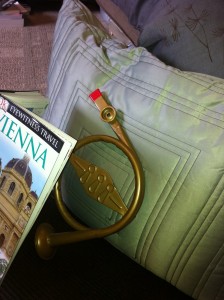 “Ahem…young master Corzoo, what book is that you are reading? Are you perhaps thinking of going somewhere?” I caught him beside my stack of travel books with his own nose buried in my Vienna book.
“Ahem…young master Corzoo, what book is that you are reading? Are you perhaps thinking of going somewhere?” I caught him beside my stack of travel books with his own nose buried in my Vienna book.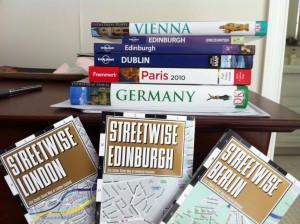 “Well, since I am so precocious, I am fully cognizant of all of the composers who lived in the various cities you are going, your destinations being apparent by the very large stack of travel books you are packing. I can use this trip to experience the cities the of the composers, visit the churches they wrote for, attend the concert halls where their music has been played for hundreds of years. Think of my musical education!”
“Well, since I am so precocious, I am fully cognizant of all of the composers who lived in the various cities you are going, your destinations being apparent by the very large stack of travel books you are packing. I can use this trip to experience the cities the of the composers, visit the churches they wrote for, attend the concert halls where their music has been played for hundreds of years. Think of my musical education!”
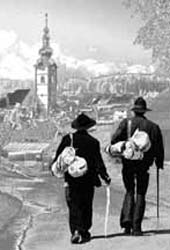
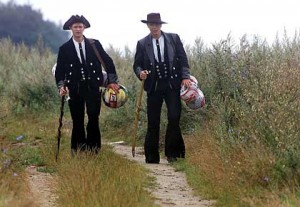 There’s something about the life of a pilgrim that has always struck me. First of all, there is a central purpose – some kind of thread that runs through the length of the journey. There is a specific path to be walked, or a particular destination. Pilgrims share the same purpose as their fellow travelers. For these Journeymen, their craft is their thread, learning as much as they can from masters in lands other than their own, so that it may inform their own craftsmanship.
There’s something about the life of a pilgrim that has always struck me. First of all, there is a central purpose – some kind of thread that runs through the length of the journey. There is a specific path to be walked, or a particular destination. Pilgrims share the same purpose as their fellow travelers. For these Journeymen, their craft is their thread, learning as much as they can from masters in lands other than their own, so that it may inform their own craftsmanship. One of the most inner-landscape-enriching places I ever visited was Israel. I went there during college to be a part of a winter music festival based outside of Jerusalem. It unfortunately no longer exists. It was a truly international group of musicians – I made some very close friends in the three weeks or so I was there and learned so much from them. We stayed in a hotel located on a kibbutz and therefore kept kosher – a new experience for me. And Israel itself worked on me. Even though I knew quite a bit about Israel before visiting, to experience a place with so much history – and ancient history! – was a revelation for a girl who had spent most of her life in a relatively new U.S. city.
One of the most inner-landscape-enriching places I ever visited was Israel. I went there during college to be a part of a winter music festival based outside of Jerusalem. It unfortunately no longer exists. It was a truly international group of musicians – I made some very close friends in the three weeks or so I was there and learned so much from them. We stayed in a hotel located on a kibbutz and therefore kept kosher – a new experience for me. And Israel itself worked on me. Even though I knew quite a bit about Israel before visiting, to experience a place with so much history – and ancient history! – was a revelation for a girl who had spent most of her life in a relatively new U.S. city.
 For right now, I find myself in Colorado surrounded by stunning landscapes. It is not a new place for me, but I hope to take a hike or two that I haven’t done before, though I am dying to revisit an old favorite once I acclimate to the altitude. I’m reading a new book and revisiting an old one. I’m practicing some old, favorite etudes and learning some new recital pieces.
For right now, I find myself in Colorado surrounded by stunning landscapes. It is not a new place for me, but I hope to take a hike or two that I haven’t done before, though I am dying to revisit an old favorite once I acclimate to the altitude. I’m reading a new book and revisiting an old one. I’m practicing some old, favorite etudes and learning some new recital pieces.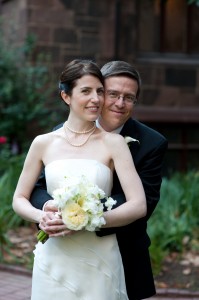 If you will allow me to go slightly off-topic, this weekend is a very special one for my husband and me: we are celebrating our first wedding anniversary! Between that and the fact that I am attending a wedding tomorrow, I have been reliving that beautiful day a year ago, and indeed all the beautiful days I have had previous and since with my husband. There is not a day that goes by when I don’t feel like the luckiest girl alive to have found my Love and be able make a life together with him.
If you will allow me to go slightly off-topic, this weekend is a very special one for my husband and me: we are celebrating our first wedding anniversary! Between that and the fact that I am attending a wedding tomorrow, I have been reliving that beautiful day a year ago, and indeed all the beautiful days I have had previous and since with my husband. There is not a day that goes by when I don’t feel like the luckiest girl alive to have found my Love and be able make a life together with him.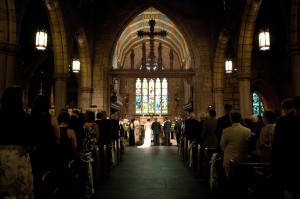 We were married at
We were married at 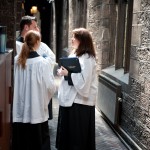 In choosing the music for our wedding, we opted to take advantage of St. Mark’s rich tradition and talents, since it is so in line with our own tastes, and chose music based on the voice. You might be asking: aren’t you both brass players? No brass?? It’s true. No brass. For whatever reason, we both have a need to escape the brass world on a regular basis. It was pure choral and organ choices with the exception of the prelude music which featured soprano
In choosing the music for our wedding, we opted to take advantage of St. Mark’s rich tradition and talents, since it is so in line with our own tastes, and chose music based on the voice. You might be asking: aren’t you both brass players? No brass?? It’s true. No brass. For whatever reason, we both have a need to escape the brass world on a regular basis. It was pure choral and organ choices with the exception of the prelude music which featured soprano 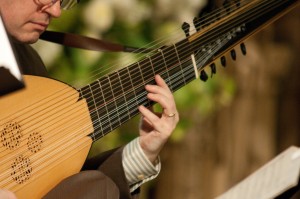 Our prelude music was put together by Laura and Richard based on some ideas of ours and it was perfect. I sat back in the cloister as long as I could to hear as much of it as possible. Both
Our prelude music was put together by Laura and Richard based on some ideas of ours and it was perfect. I sat back in the cloister as long as I could to hear as much of it as possible. Both 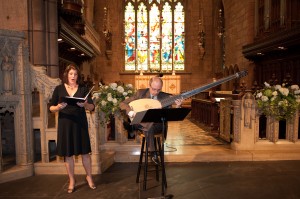 — Henry Purcell: Crown the altar
— Henry Purcell: Crown the altar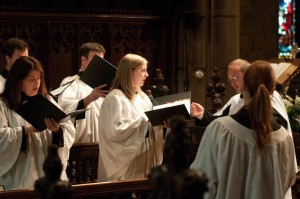 Here is some of the music from the service. Unfortunately, none of the clips I have here are the St. Mark’s Choir, but just of the recordings that I have of the pieces. Enjoy!
Here is some of the music from the service. Unfortunately, none of the clips I have here are the St. Mark’s Choir, but just of the recordings that I have of the pieces. Enjoy! As time went on, I became more aware of just how wide-ranging Mike’s interests and projects are and just how many different things he has his fingers in! What we talk about in the following paragraphs still only covers a portion of his interests and experiences. I hope you enjoy as much as I did his fascinating anecdotes and thoughts throughout this interview: his start on the horn, his time in China, his observations about being a musician and a freelancer in these times, and learning about all of his many projects and endeavors. I think you just might find your own ideas and juices flowing a little more after reading what Michael has to say!
As time went on, I became more aware of just how wide-ranging Mike’s interests and projects are and just how many different things he has his fingers in! What we talk about in the following paragraphs still only covers a portion of his interests and experiences. I hope you enjoy as much as I did his fascinating anecdotes and thoughts throughout this interview: his start on the horn, his time in China, his observations about being a musician and a freelancer in these times, and learning about all of his many projects and endeavors. I think you just might find your own ideas and juices flowing a little more after reading what Michael has to say! Ten years after I stopped composing, I acquired a copy of Sibelius notation software and quickly figured out the basics. After attending a few workshops and seminars, I had become pretty fluent; my newfound skills enabled me to do a lot more writing of all kinds, including the occasional little arranging and copying jobs. Opportunities to put my arranger chops to use started to pick up for me quite a bit after I met Sufjan Stevens, who hired me to play horn and do some arranging on a few tours. Working with Sufjan and his musical family inspired me deeply, and I began to write music again in 2006. Since then, I have completed a set of five horn duets, a mixed ensemble piece, and a woodwind quartet. I do have many other pieces sketched out and a few of them nearly complete, including a brass dectet for my friends in the Washington D.C.-based National Brass Collective.
Ten years after I stopped composing, I acquired a copy of Sibelius notation software and quickly figured out the basics. After attending a few workshops and seminars, I had become pretty fluent; my newfound skills enabled me to do a lot more writing of all kinds, including the occasional little arranging and copying jobs. Opportunities to put my arranger chops to use started to pick up for me quite a bit after I met Sufjan Stevens, who hired me to play horn and do some arranging on a few tours. Working with Sufjan and his musical family inspired me deeply, and I began to write music again in 2006. Since then, I have completed a set of five horn duets, a mixed ensemble piece, and a woodwind quartet. I do have many other pieces sketched out and a few of them nearly complete, including a brass dectet for my friends in the Washington D.C.-based National Brass Collective. It’s hard to find the words; the best way I can describe it is every time we play feels like being at music camp for the first time. There are many talented musicians in The Knights, and the environment that Eric and Colin Jacobsen have created is very conducive to exploring and utilizing all of the group’s individual and collective talents. We play arrangements and pieces written by fellow Knights, we break into smaller ensembles for some concerts, and we like to rehearse and even do sectionals – a lot. The Knights also handle the administration of the group through player committees. As one of my favorite Knights, Christina Courtin, puts it: “We like music!”
It’s hard to find the words; the best way I can describe it is every time we play feels like being at music camp for the first time. There are many talented musicians in The Knights, and the environment that Eric and Colin Jacobsen have created is very conducive to exploring and utilizing all of the group’s individual and collective talents. We play arrangements and pieces written by fellow Knights, we break into smaller ensembles for some concerts, and we like to rehearse and even do sectionals – a lot. The Knights also handle the administration of the group through player committees. As one of my favorite Knights, Christina Courtin, puts it: “We like music!” Yes, it is true! I got to know the Barbies at various points over the years, and am happy to have them playing my works. At first, I was unsure about what they wanted to do with such a group, but as time went on, I became impressed at their dedication to the hard work of promoting themselves and finding new opportunities. They really carved out a place for themselves, and people are talking about them quite a bit on the internet and around town. I smiled when
Yes, it is true! I got to know the Barbies at various points over the years, and am happy to have them playing my works. At first, I was unsure about what they wanted to do with such a group, but as time went on, I became impressed at their dedication to the hard work of promoting themselves and finding new opportunities. They really carved out a place for themselves, and people are talking about them quite a bit on the internet and around town. I smiled when 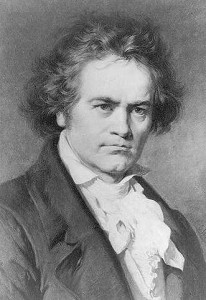 I have had the opportunity to play Beethoven’s Ninth Symphony on several occasions now between my work in New York and Philadelphia. This past week I played four concerts of this great work. One of the most stunning things to me about the experience of playing it is that, without fail, the houses are nearly always full or sold out. People show up in droves to hear it – and they are an exuberant bunch! You get the feeling that this is an Event – definitely with a capital “E” and probably with an exclamation point!
I have had the opportunity to play Beethoven’s Ninth Symphony on several occasions now between my work in New York and Philadelphia. This past week I played four concerts of this great work. One of the most stunning things to me about the experience of playing it is that, without fail, the houses are nearly always full or sold out. People show up in droves to hear it – and they are an exuberant bunch! You get the feeling that this is an Event – definitely with a capital “E” and probably with an exclamation point! I was recently talking with my mother about commitment. She and my dad, as music teachers, have seen a decline over the years in commitment of students to be a reliable part of band and chorus. What’s more is that sometimes the parents don’t even encourage and support an attitude of commitment from their child. Showing up for and prioritizing an activity seem the exception rather than the rule. Things happen of course – people get sick (as I write this I’m unexpectedly at home sick when I was supposed to be in New York), but this is less about the bumps that keep us away from time to time and more about the daily attitude of showing up and being fully engaged in certain endeavors.
I was recently talking with my mother about commitment. She and my dad, as music teachers, have seen a decline over the years in commitment of students to be a reliable part of band and chorus. What’s more is that sometimes the parents don’t even encourage and support an attitude of commitment from their child. Showing up for and prioritizing an activity seem the exception rather than the rule. Things happen of course – people get sick (as I write this I’m unexpectedly at home sick when I was supposed to be in New York), but this is less about the bumps that keep us away from time to time and more about the daily attitude of showing up and being fully engaged in certain endeavors. There is A LOT of music to be heard before that last joyful shout. The emotional impact of the last movement is only really possible because of the context. Hearing that melody in a commercial, or singing it as a hymn in church may be all well and good, but it just doesn’t match the joy felt in the real thing. The audience has been on a journey with the orchestra and chorus for a full hour or so already – they showed up and committed to the whole darn thing. The storminess of the first movement, the quirky dances of the second, the reminisces and ruminations of the third movement, and exhaustive (and exhausting!) repetition and re-working of themes in all movements – this is what makes the drama and joy possible in the end. Beethoven gives back to you in equal measure what you give to him. Your time and attention do not go unrewarded!
There is A LOT of music to be heard before that last joyful shout. The emotional impact of the last movement is only really possible because of the context. Hearing that melody in a commercial, or singing it as a hymn in church may be all well and good, but it just doesn’t match the joy felt in the real thing. The audience has been on a journey with the orchestra and chorus for a full hour or so already – they showed up and committed to the whole darn thing. The storminess of the first movement, the quirky dances of the second, the reminisces and ruminations of the third movement, and exhaustive (and exhausting!) repetition and re-working of themes in all movements – this is what makes the drama and joy possible in the end. Beethoven gives back to you in equal measure what you give to him. Your time and attention do not go unrewarded! Throughout our musical lives, we come across various kinds of Blank Spaces in our calendars. They can feel like a blessing or a curse depending on the situation. For students there is the oft-longed-for Summer Vacation. For recent graduates and hopeful freelancers there is an integration period into the scene that can feel frighteningly uncertain. For current freelancers, there are the natural lulls that are just part of the cycle of the musical year and of a freelance career. For orchestral musicians there are the weeks of vacation that are often used for deep rest and renewal, or for the pursuit of personal projects, or for catching up on family life and things around the house. Then there are the “enforced” periods of time away from playing due to injury or to being very busy with something else – like caring for someone else – perhaps a baby, or an elderly parent, or a sick spouse.
Throughout our musical lives, we come across various kinds of Blank Spaces in our calendars. They can feel like a blessing or a curse depending on the situation. For students there is the oft-longed-for Summer Vacation. For recent graduates and hopeful freelancers there is an integration period into the scene that can feel frighteningly uncertain. For current freelancers, there are the natural lulls that are just part of the cycle of the musical year and of a freelance career. For orchestral musicians there are the weeks of vacation that are often used for deep rest and renewal, or for the pursuit of personal projects, or for catching up on family life and things around the house. Then there are the “enforced” periods of time away from playing due to injury or to being very busy with something else – like caring for someone else – perhaps a baby, or an elderly parent, or a sick spouse. Eleanor Roosevelt is one of my heros. I find her energy, sense of adventure, and insatiable desire to learn and experience all that life has to offer so compelling and the courage with which she faced her insecurities inspiring. I tore through the two-volume biography of her by Blanche Wiesen Cook several years ago, I’ve read a collection that contains much of her daily column entries, and there’s this one book by Mrs. Roosevelt herself called You Learn By Living. I treasure this book and think that it should be required reading for everyone!
Eleanor Roosevelt is one of my heros. I find her energy, sense of adventure, and insatiable desire to learn and experience all that life has to offer so compelling and the courage with which she faced her insecurities inspiring. I tore through the two-volume biography of her by Blanche Wiesen Cook several years ago, I’ve read a collection that contains much of her daily column entries, and there’s this one book by Mrs. Roosevelt herself called You Learn By Living. I treasure this book and think that it should be required reading for everyone!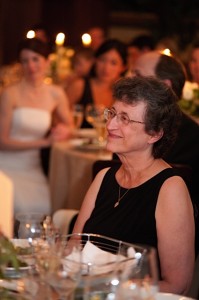 In continued anticipation of Mother’s Day, I want to introduce you more thoroughly to my own mother and to some of the things she taught me, both through music and away from music. This Mother’s Day is an especially big day for her because it also happens to be her birthday and she is turning 60 years old! I would like to invite all of my blog readers to participate in this post by adding thoughts about your own mothers (whether or not she is a Music Mom!). And, Moms, I’d love to hear from you too about being a mother and what you want most for your children. So, please, comment freely. I look forward to reading your contributions!
In continued anticipation of Mother’s Day, I want to introduce you more thoroughly to my own mother and to some of the things she taught me, both through music and away from music. This Mother’s Day is an especially big day for her because it also happens to be her birthday and she is turning 60 years old! I would like to invite all of my blog readers to participate in this post by adding thoughts about your own mothers (whether or not she is a Music Mom!). And, Moms, I’d love to hear from you too about being a mother and what you want most for your children. So, please, comment freely. I look forward to reading your contributions!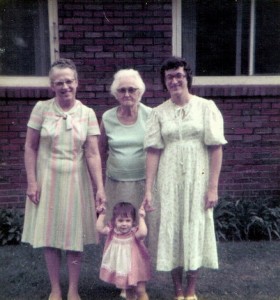 By her own example, she also taught me (and continues to teach me) how never to make decisions based in fear, but to live out of love – to trust and to be open and brave.
By her own example, she also taught me (and continues to teach me) how never to make decisions based in fear, but to live out of love – to trust and to be open and brave.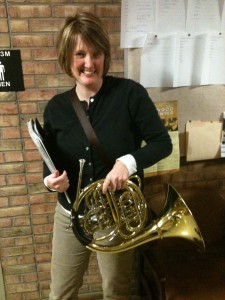 We hear so much about Soccer and Hockey Moms – but let’s talk about Music Moms! Since Mother’s Day is almost here, I thought I would use today and the rest of this week to pay tribute to these amazing women. They play an extraordinary role in the development of young musicians. They are responsible for their child’s earliest exposure to music; they play the role of Motivator (when the kids need, ahem, “encouragement” to practice); they are Road Warriors shuttling kids to and from lessons, auditions, competitions; and last but not least, they are Armchair/Bedside/Driver’s-Seat Psychologists in helping their children navigate the peaks and valleys of excelling at something that requires so much work, and so much of yourself.
We hear so much about Soccer and Hockey Moms – but let’s talk about Music Moms! Since Mother’s Day is almost here, I thought I would use today and the rest of this week to pay tribute to these amazing women. They play an extraordinary role in the development of young musicians. They are responsible for their child’s earliest exposure to music; they play the role of Motivator (when the kids need, ahem, “encouragement” to practice); they are Road Warriors shuttling kids to and from lessons, auditions, competitions; and last but not least, they are Armchair/Bedside/Driver’s-Seat Psychologists in helping their children navigate the peaks and valleys of excelling at something that requires so much work, and so much of yourself.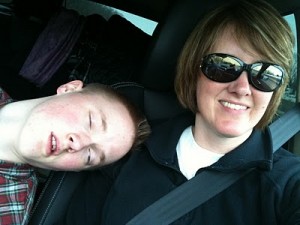 And at this point I absolutely must introduce to you the lovely lady in both of these photos. This is Larisa Kennedy, my student Mark’s mom, who (along with my own mother, of course!) is the Queen Of All Music Moms, making the over-three-hour trek from State College, PA with three of her kids to Philadelphia for lessons every other week. And that’s just the beginning! This year has been a very full year with Mark’s college auditions and they drove and flew all over the place. She is tireless and incredibly inspirational. Her commitment (and the commitment of the whole family) and Mark’s hard work paid off – he’s headed to University of Michigan next year to study with Adam Unsworth. Hooray!
And at this point I absolutely must introduce to you the lovely lady in both of these photos. This is Larisa Kennedy, my student Mark’s mom, who (along with my own mother, of course!) is the Queen Of All Music Moms, making the over-three-hour trek from State College, PA with three of her kids to Philadelphia for lessons every other week. And that’s just the beginning! This year has been a very full year with Mark’s college auditions and they drove and flew all over the place. She is tireless and incredibly inspirational. Her commitment (and the commitment of the whole family) and Mark’s hard work paid off – he’s headed to University of Michigan next year to study with Adam Unsworth. Hooray!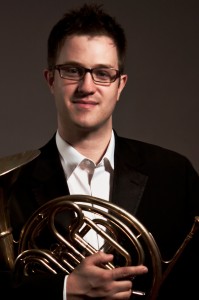 Hometown: Evansville, IN
Hometown: Evansville, IN